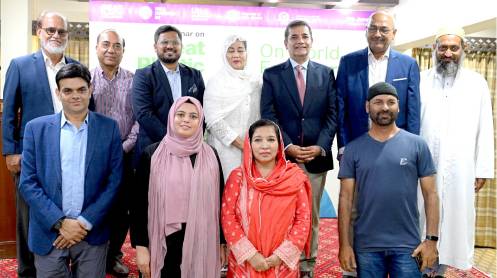There is no authentic data available on the massive quantity of solid waste including plastic trash generated in Karachi daily owing to which it is very difficult to devise an effective plan to deal with this hazardous issue of the city.
This was stated by the speakers including environmentalists who spoke at a seminar on plastic pollution organised by the National Forum for Environment and Health (NFEH) to mark World Environment Day.
Shariq Vohra, former president of the Karachi Chamber of Commerce and Industry (KCCI) and who himself is involved in the plastic recycling industry, said that authentic data on solid waste is vital for adopting an effective trash disposal scheme.
He told the audience that quite often it was informed that Karachi generated around 12,000 tonnes of solid waste every day but given his firsthand involvement in the plastic recycling business, he had come to know that the quantity of trash generated in the city was much higher.
Vohra said that a blanket ban imposed by the government to deal with the issue of polythene bags would prove counterproductive as instead the policies of recycling and reuse should be adopted for dealing with the issue of plastic pollution.
Vohra recalled that during his tenure as the KCCI president, the ban on plastic shopping bags had come into effect but the government’s order in question had provided an opportunity for the police to receive bribes from the traders involved in the polythene business.
He said the culture of recycling and reuse was the best way to deal with the issue of waste generated due to plastics which is otherwise a very valuable industrial innovation given its widespread use in many fields including healthcare services.
He urged the citizens to minimise the use of products made of single-use plastic to do their due role in lessening solid waste generated in the cities.
The KCCI former president also called for establishing waste-to-energy plants in the main urban centres of Pakistan so that there was no need for transporting municipal waste for several kilomtres for their disposal at the designated landfill sites.
Senior environmentalist, Saqib Ejaz Hussain, said the issue of plastic waste was directly related to goal number 12 and 14 of the Sustainable Development Goals of the UNO dealing with responsible production and consumption and protection of underwater life.
He said that Pakistan had to deal with 3.9 million tonnes of plastic waste every year causing serious pollution in the country.
He lamented that Pakistan had the most mismanaged situation of plastic pollution in entire South Asia.
He said that microplastic particles were present everywhere including in the indoor environment creating serious hazards to human health.
Senior environmental journalist Shabina Faraz said the developed countries should compensate for the massive losses Pakistan had suffered due to floods and other extreme weather events owing to these nations’ massive involvement in the issues of global warming and climate change.
Ali Asghar Khadim, briefed the audience, about the efforts of the Dawoodi Bohra community to improve the environment by taking part in the cleanliness and tree plantation campaigns in Karachi.
In his remarks as the chief guest, Karachi Administrator, Dr Syed Saif-ur-Rehman, said that people should consume water very cautiously due to fast-depleting water reserves and also make efforts to discourage the consumption of single-use plastic products.
He urged every citizen to plant at least one tree and fully took care of it for his or her role in improving the environment.
He reiterated the resolve of the Karachi Metropolitan Corporation of improving the environment of the city by developing green open urban spaces.
NFEH President Naeem Qureshi said that his non-governmental organisation would host more such awareness and interactive programmes to discuss and find effective ways and means to tackle major environmental challenges in the country including plastic pollution. He demands government should announce a national action plan to reduce, recycle of plastic waste. Secretary General NFEH Ruqiya Naeem, VP Engr. Nadeem Ashraf & Environmentalist Zahra Ali Syed also spoke on this occasion.
NFEH marks World Environment Day ‘No authentic data available on municipal waste including plastic trash generated in Karachi’







